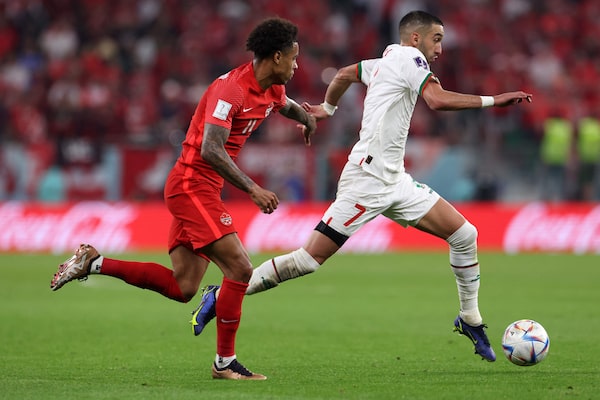
Canada's forward Tajon Buchanan fights for the ball with Morocco's Hakim Ziyech during the Qatar 2022 World Cup Group F match between at the Al-Thumama Stadium in Doha on Dec. 1.FADEL SENNA/AFP/Getty Images
Going into this World Cup, the thinking was that the closest Canada would come to a fair fight would be its last group game, against Morocco.
Morocco was the measuring line. Despite all the upended expectations since arriving here, it still was, though not in the way intended.
Canada wanted a result on Thursday. Morocco needed one. That showed in the end.
What showed in the beginning was Canadian naiveté. In attempting to outfox Morocco, Canadian coach John Herdman completely revamped his starting midfield and his formations, and once again redeployed Alphonso Davies to a new spot on the field.
It was the midfield in particular that caught your eye, and not in a good way. So much was changed, with so little obvious rationale, that you got the sense of Canada throwing stuff at the wall to see if there was a wall.
Thursday’s news from Doha: there was no wall.
Some of that was unavoidable because of injury. But some of it was errant creativity. The result was a disastrous first half.
Canada was “bending, but not breaking” (Herdman’s term) for about four minutes. Then it snapped like a dollar-store spatula.
That’s when defender Steven Vitoria decided to turn an easy pass back to his goalie into a Himalayan adventure. Forced to climb farther out of his area than he’d intended, Canadian ‘keeper Milan Borjan panicked, passing the ball directly to Morocco’s most dangerous player, Hakim Ziyech.
Ziyech calmly chipped Borjan like he was trying to hit a practice green: 1-0.
Twenty minutes later, Canada’s reconfigured midfield still had yet to show up for work. Morocco’s Achraf Hakimi, far and away the best player on the field, launched a ball through them from the stadium parking lot. Or maybe it just seemed that far away in the stands.
Hakimi’s rocket ended up on the foot of Youssef En-Nesyri. He (literally) fought off two Canadian defenders and slotted beautifully: 2-0.
Canada did score in the first half – a fantastic tip by Nayef Aguerd. Sadly for Aguerd, it was into his own net.
If the Canadians went into the half respectable on the scoreboard, that was the only place you could say that. Everywhere else, they were in disarray.
A good example was the play of Davies. Playing in a forward role, he seemed intent on dribbling across every inch of the field without passing. It was as though he had taken a look at things and decided he was going to have to do it all himself.
The second half was a different story. Exactly what sort of story depends on the sort of person you are.
Once the players who’d been healthy scratches as starters were brought on as substitutes, the game shifted to advantage: Canada. Morocco did play its part in this by folding up into its own third to guard the lead. But Canada just looked as though it finally had a handle on its approach.
If you’re an optimist, that’s a show of remarkable pride. It’s proof Canada has what it takes to slug with the very best, even when it should be flat on the mat and calling for a stretcher.
If you’re a pessimist, it’s proof that if Herdman hadn’t tried to Einstein it in the first half, things might have turned out differently. It’s snatching defeat from the jaws of a draw.
Canada did nearly pull even. In the 72nd minute, an Atiba Hutchinson header hit the underside of the crossbar, landed on the Moroccan goal line and bounced backward out of the net. A subsequent attempt skimmed the top of the bar.
Eleven inches or so. That’s the closest Canada came to taking points from a men’s World Cup.
The Canadians end their campaign with three losses, but of highly varying quality. The loss to Belgium was a win in disguise. The loss to Croatia was a low-key humiliation. The loss to Morocco was a reminder never to be too cute.
Afterward, Herdman was keen to move quickly to the summation stage of things (“We’ve enjoyed the ride”).
He glossed over the changes he’d made, and wanted to talk instead in slogans (“The world level’s the next level. We weren’t far off.”).
The cumulative effect was somewhere between success and disappointment. Exactly where this outing lies may not become apparent for years.
Herdman and his players like to talk a lot – and I mean, a lot – about learning opportunities. Fine. But at some point, you have to start moving from learning in the direction of learned.
Canada didn’t do that against Morocco. This team seemed to know less about its opponents and itself as this World Cup went on.
Judged from the vantage of five years ago, getting to Qatar is a bona fide miracle.
From a year ago, it’s an unqualified success, regardless of how it turned out.
From two weeks ago, it’s a step forward, considering that two goals – one put in net by a genuine Canadian – were scored.
From two days ago, it’s a step in the wrong direction. It’s being given an opportunity and finding a way to hand it back.
And from right now, after watching Morocco – a team Canada was once thought to be the rough equal to – top Group F and move on to the knockout stages, it’s just a bit of a bummer.
 Cathal Kelly
Cathal Kelly